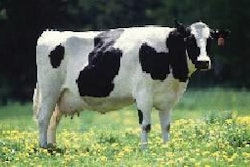Can we be the greenest generation? That question was raised as the theme for Alltech's 24th International Animal Health and Nutrition Symposium held in April. But more than just a conference catch-phrase, it's a theme that is resonating with increased urgency in agriculture circles, including the feed industry, as producer and supplier come to grips with agriculture's responsibility for creating a more sustainable environment...and remaining profitable along the way.
Behind the quest for the green is a revolution fueled in large part by deep-felt concern over renewable fuel production and its likely link to the spiraling cost of feed and food.
Wrapped within the folds of the debate over corn for ethanol versus corn for livestock is the overriding question of addressing the need for renewable and alternative fuels. One of the questions volleyed back and forth is that of, just how environmentally friendly is ethanol production? Statistics are no scarcity on either side of the issue, with skeptics pointing to the energy necessary for the production of ethanol, the depletion of natural resources and poorer fuel efficiency while those in the industry claim improved technologies make such arguments antiquated.
Fuel for debate
The Alltech Symposium ended on a call for action for agriculture to take the lead in creating the greenest generation and embrace the wide ranging solutions available to the world. These newest green technologies, stressed speaker upon speaker, should be the focus for agriculture, not the clash over corn.
Alltech's founder and president, Dr. Pearse Lyons, challenged the symposium audience by urging them to rethink technology and business practices and transform the agricultural industry.' The future of the next generation, he stressed, will depend on redefining our mind set and it is the current generation's responsibility to feed a hungry world. "Necessity is the mother of invention," he noted. "We must constantly look for sustainable energy resources."
But can agriculture develop sustainable energy resources, protect the environment and feed a growing global population? How does the feed industry choose among these priorities for a future generation?
You don't. It shouldn't be a question of starvation versus environmental deprivation at all, because one isn't more important than the other, pointed out Osler Desouzart. Desouzart is president of OD Consulting and formerly with Sadia, Perdigao and Doux Frangosul in Brazil. He is a frequent lecturer worldwide on international trade and competition in the agro-food business.
He was one of three noted agricultural policy makers to debate feed, food and fuel issues as part of Alltech's Symposium. Desouzart was joined by Mike Johanns, former secretary of the U.S. Department of Agriculture (USDA) and David Byrne, former European Union Commissioner for Health and Consumer Protection.
When asked about the competing forces on feed and food and the need for sustainability, Desouzart said the answer is easy. If technologies are allowed to be applied to the matters of both fuel and food, then the growing global population can be satisfied and more environmentally friendly practices will rise to the top.
Desouzart said agriculture will produce enough cereals, roots, sugar, vegetable oils, meat, and other foods to meet the growing demand. "We have to do it, we will do it. We can do it without destroying the planet." Key, said Desouzart, is allowing the feed industry to do its job and for science — not sensationalism and faulty logic — to prevail.
All three industry leaders taking part in the food and fuel debate underscored the need for further investment in science and for the application of emerging research and technologies to address the issues surrounding food, feed and fuel and its impact on the environment. Byrne added that consumer confidence is key as agriculture moves forward, a lesson he learned well during the height of the BSE scare in Europe.
Feed and livestock production can be central to the goal of being green, Secretary Johanns asserted. "So how do we get to be the greenest generation? The better our feed conversion, the less impact on the environment." Secretary Johanns pointed out that if agriculture can improve the efficiencies of livestock, the carbon footprint of agriculture can be reduced.
All three leaders pointed to the continued need for research and adoption of technologies. Some in the feed industry have been taking such advice to heart in addressing the need for alternatives to grain-based renewable fuels. Both Alltech and Genecor (a division of Danisco) recently proclaimed plans to move forward with biorefinery projects that utilize cellulose rather than grain, for production of renewable fuel and other value-added products.
Alltech's rural community biorefinery is claimed to be one of the first in the U.S. to utilize cellulose, such as switch grass, corn cobs and corn stover, at raw material levels of up to 30 percent. This will be converted to ethanol and other value-added products.
"Cellulosic ethanol utilizes raw materials which are readily available and which alleviate the current demand for grain for ethanol production. With commodity prices reaching an all time high and with ethanol production forecast to account for 30 percent of the U.S. corn harvest by 2010, we must focus our attention on a sustainable path to alternative energies," said Dr. Lyons.
The facility will also have the capability to produce algae, a plant that can produce 5,000 gallons of biofuel per acre per year compared to the 400 gallons produced by corn.
The company says the science does not stop there.. As part of the project's research component, Alltech will coordinate R&D activities with the University of Kentucky and the University of Cincinnati. Researchers will work to identify and address process improvements, develop economically and environmentally sound technologies, as well as use process simulation to reduce raw material costs and optimize energy utilization.
On the heels of Alltech's announcement that it had received a U.S. Department of Energy grant that would allow its rural biorefinery project to move forward, DuPont and Genencor, a division of Danisco A/S, announced an agreement to form DuPont Danisco Cellulosic Ethanol LLC, a 50/50 global joint venture to develop and commercialize technology for the production of cellulosic ethanol.
The partners plan an initial three-year investment of US$140 million, which will initially target corn stover and sugar cane bagasse. Future targets include multiple lingo-cellulosic feedstocks, including wheat straw, a variety of energy crops and other biomass sources.
"This joint venture will be a powerhouse of discovery, development and engineering. It represents a major step forward in Danisco's new strategic intent to be a leading force in the field of industrial biotechnology." said Danisco CEO Tom Knutzen.
Its first pilot plant is expected to be operational in the U.S. by 2009, and its first commercial-scale demonstration facility should be operational within the next three years. The companies say the joint venture will license its technology package directly to ethanol producers for deployment globally, as well as through the establishment of regional cellulosic ethanol affiliates. The regional ethanol affiliates will invest in equity interests with strategic partners, including ethanol producers and energy companies.
Signs of a greener generation can be found elsewhere in the feed industry as well, with some of the largest players changing the way they do business. One of those making changes from the ground up is Novus International Inc. The company is investing $20 million in a new 90,000-square-foot office building and achieve Leadership in Energy and Environmental Design (LEED) platinum certification from the U.S. Green Building Council, the highest level of LEED certification.
Richard L. Bond, president and CEO of Tyson Foods, has been one of the most vocal in stating his concerns over the impact corn-based ethanol is having on the price of grain. At the same time, Tyson is not just raising concerns, but also engaging in alternative activities for sustainability. According to the company, it has reduced its water usage by 15 percent per pound of finished product over the past two years and intends to implement additional water conservation measures in fiscal 2008. Through its alliances with other businesses, Tyson expects to produce up to 250 million gallons of renewable fuel a year produced from animal fat over the next three to four years.
And there are more examples within the industry. Equipment and transport manufacturers, for example, are focusing on more energy efficient equipment. Ingredient manufacturers are working to reduce the impact of nutrients on the environment, with new products hitting the market.
"We believe sustainability is essentially doing the right thing, whether it involves protecting natural resources, creating alternative energy or feeding the hungry," sums up Bond.
.jpg?auto=format%2Ccompress&crop=faces&fit=crop&h=48&q=70&w=48)















